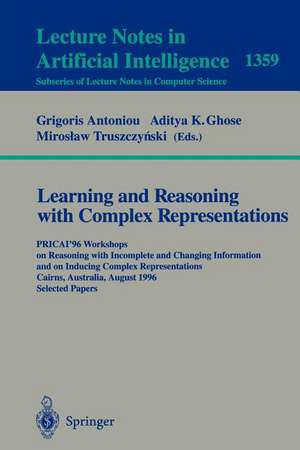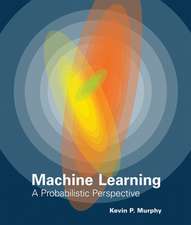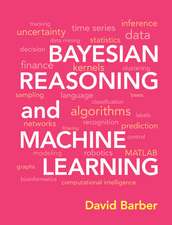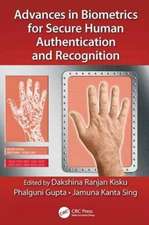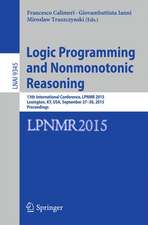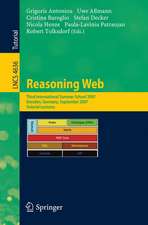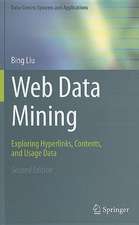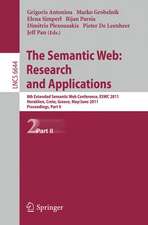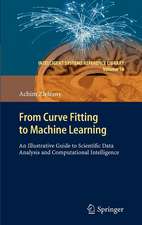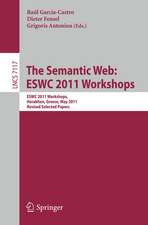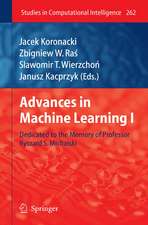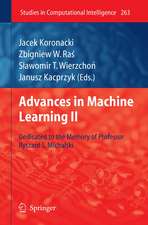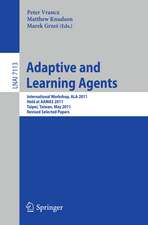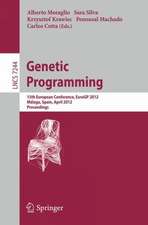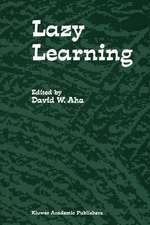Learning and Reasoning with Complex Representations: PRICAI'96 Workshops on Reasoning with Incomplete and Changing Information and on Inducing Complex Representations Cairns, Australia, August 26-30, 1996, Selected Papers: Lecture Notes in Computer Science, cartea 1359
Editat de Grigoris Antoniou, Aditya K. Ghose, Miroslaw Truszczynskien Limba Engleză Paperback – 15 apr 1998
The volume presents 14 revised full papers togehter with two invited contributions and two introductory surveys particularly commissioned for this book. Among the topics addressed are computational learning, commonsense reasoning, constraint logic programming, fuzzy reasoning, vague data, inductive inference, belief revision, action theory, uncertainty, and probabilistic diagnosis.
Din seria Lecture Notes in Computer Science
- 20%
 Preț: 1061.55 lei
Preț: 1061.55 lei - 20%
 Preț: 307.71 lei
Preț: 307.71 lei - 20%
 Preț: 438.69 lei
Preț: 438.69 lei - 20%
 Preț: 579.30 lei
Preț: 579.30 lei -
 Preț: 410.88 lei
Preț: 410.88 lei - 17%
 Preț: 427.22 lei
Preț: 427.22 lei - 20%
 Preț: 596.46 lei
Preț: 596.46 lei - 15%
 Preț: 448.04 lei
Preț: 448.04 lei - 20%
 Preț: 353.50 lei
Preț: 353.50 lei -
 Preț: 389.49 lei
Preț: 389.49 lei - 20%
 Preț: 309.90 lei
Preț: 309.90 lei - 20%
 Preț: 645.28 lei
Preț: 645.28 lei - 20%
 Preț: 763.23 lei
Preț: 763.23 lei - 15%
 Preț: 580.46 lei
Preț: 580.46 lei - 20%
 Preț: 310.28 lei
Preț: 310.28 lei - 20%
 Preț: 655.02 lei
Preț: 655.02 lei - 20%
 Preț: 1183.14 lei
Preț: 1183.14 lei - 20%
 Preț: 340.32 lei
Preț: 340.32 lei -
 Preț: 449.57 lei
Preț: 449.57 lei - 20%
 Preț: 591.51 lei
Preț: 591.51 lei - 18%
 Preț: 938.83 lei
Preț: 938.83 lei - 20%
 Preț: 337.00 lei
Preț: 337.00 lei - 20%
 Preț: 649.50 lei
Preț: 649.50 lei - 20%
 Preț: 607.40 lei
Preț: 607.40 lei - 20%
 Preț: 1414.79 lei
Preț: 1414.79 lei - 20%
 Preț: 1024.44 lei
Preț: 1024.44 lei - 20%
 Preț: 583.40 lei
Preț: 583.40 lei - 20%
 Preț: 453.32 lei
Preț: 453.32 lei - 20%
 Preț: 575.49 lei
Preț: 575.49 lei - 20%
 Preț: 1075.26 lei
Preț: 1075.26 lei - 20%
 Preț: 585.88 lei
Preț: 585.88 lei - 20%
 Preț: 825.93 lei
Preț: 825.93 lei - 17%
 Preț: 360.20 lei
Preț: 360.20 lei - 20%
 Preț: 763.23 lei
Preț: 763.23 lei - 20%
 Preț: 340.32 lei
Preț: 340.32 lei - 20%
 Preț: 504.58 lei
Preț: 504.58 lei - 20%
 Preț: 369.13 lei
Preț: 369.13 lei - 20%
 Preț: 580.93 lei
Preț: 580.93 lei - 20%
 Preț: 343.62 lei
Preț: 343.62 lei - 20%
 Preț: 350.21 lei
Preț: 350.21 lei - 20%
 Preț: 583.40 lei
Preț: 583.40 lei - 20%
 Preț: 583.40 lei
Preț: 583.40 lei - 15%
 Preț: 438.59 lei
Preț: 438.59 lei - 20%
 Preț: 341.95 lei
Preț: 341.95 lei - 20%
 Preț: 238.01 lei
Preț: 238.01 lei - 20%
 Preț: 538.30 lei
Preț: 538.30 lei
Preț: 332.57 lei
Preț vechi: 415.71 lei
-20% Nou
Puncte Express: 499
Preț estimativ în valută:
63.65€ • 66.20$ • 52.54£
63.65€ • 66.20$ • 52.54£
Carte tipărită la comandă
Livrare economică 14-28 aprilie
Preluare comenzi: 021 569.72.76
Specificații
ISBN-13: 9783540644132
ISBN-10: 354064413X
Pagini: 300
Ilustrații: XII, 288 p.
Dimensiuni: 155 x 235 x 16 mm
Greutate: 0.42 kg
Ediția:1998
Editura: Springer Berlin, Heidelberg
Colecția Springer
Seriile Lecture Notes in Computer Science, Lecture Notes in Artificial Intelligence
Locul publicării:Berlin, Heidelberg, Germany
ISBN-10: 354064413X
Pagini: 300
Ilustrații: XII, 288 p.
Dimensiuni: 155 x 235 x 16 mm
Greutate: 0.42 kg
Ediția:1998
Editura: Springer Berlin, Heidelberg
Colecția Springer
Seriile Lecture Notes in Computer Science, Lecture Notes in Artificial Intelligence
Locul publicării:Berlin, Heidelberg, Germany
Public țintă
Professional/practitionerCuprins
Inductive constraint logic programming: An overview.- Some approaches to reasoning with incomplete and changing information.- Curried least general generalization: A framework for higher order concept learning.- Approximate validity.- Inductive theories from equational systems.- The role of default representations in incremental learning.- Learning stable concepts in a changing world.- Inducing complex spatial descriptions in two dimensional scenes.- A framework for learning constraints: Preliminary report.- Induction of constraint logic programs.- Belief network algorithms: A study of performance based on domain characterisation.- A Group Decision and Negotiation Support System for argumentation based reasoning.- From belief revision to design revision: Applying theory change to changing requirements.- Using histories to model observations in theories of action.- Modelling inertia in action languages.- Combinatorial interpretation of uncertainty and conditioning.- Probabilistic diagnosis as an update problem.- Cooperative combination of default logic and autoepistemic logic.
